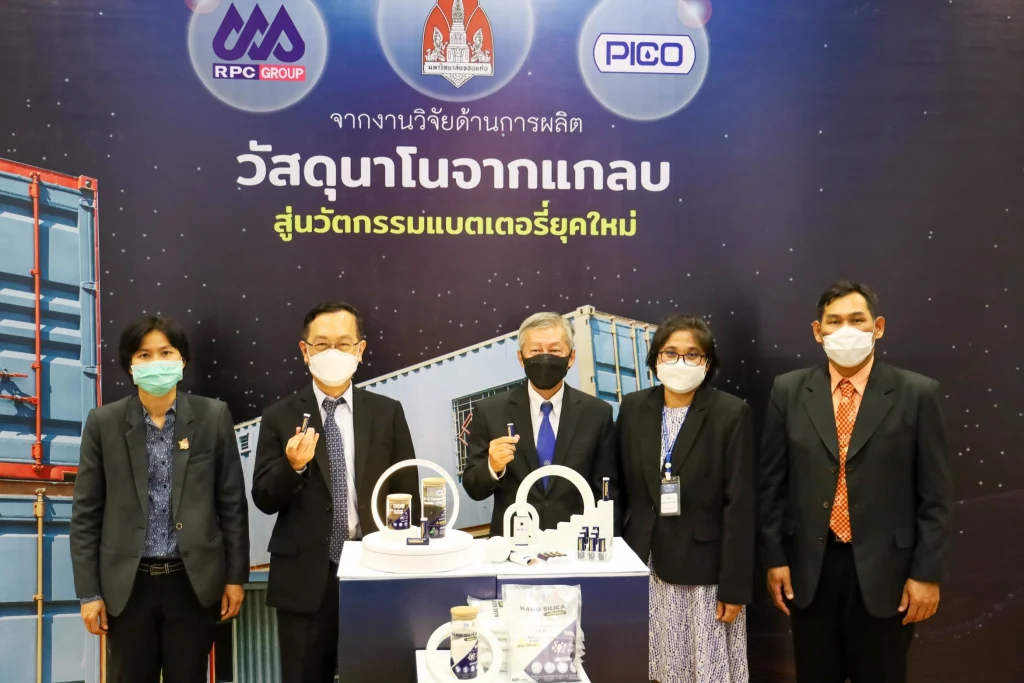Thursday February 10, 2022 – Khon Kaen University met the press to release news on the research on nano-material production from rice husk as a new-era battery innovation. The research is under the Pilot Factory Project that produces materials for electrodes in Li-ion batteries. Assoc. Prof. Charnchai Panthongviriyakul, M.D., President of Khon Kaen University led the research team including the Project Leader, Assoc. Prof. Nongluck Meethong, Ph.D., to present the project implementation and the research outcome; Khun Satja Jenthemnukul, General Director and Khun Kalaya Khlaithong, General Manager for Business Development of R.P.C.G Public Company; Khun Akkathat Chawanapong, General Director of Petro-Instrument Co. Ltd. and KKU administrators, to release the news on the project outcomes. Over 50 news reporters and interested individuals attended. The event, which took place at Room 3, Science Park Building KKU, guarded strictly against Covid pandemic.

The Pilot Factory Project that produces materials for electrodes in batteries from rice husk started its mission in May 2017 with collaboration from 3 organizations that saw the opportunities in development and extension of the research work from laboratory towards a commercial level, namely, R.P.C.G Public Company, Petro-Instrument Co. Ltd., and Khon Kaen University. The research project has experimented on the production of nano-silicon from husk to use as anode in lithium-ion batteries at a pilot scale in order to develop raw materials for future commercial manufacturing of Li-ion batteries.

Assoc. Prof. Charnchai Panthongviriyakul, M.D., President of Khon Kaen University, who chaired the press meeting session, welcomed the guests and the news reporters before explaining about the Pilot Factory Project that produces materials for electrodes in Lithium-ion batteries from rice husk. “The 3 parties have strong determination for the Project. The two companies supported in terms of budget, equipment and tools for the implementation, which were carried out at the Northeast Science Park. Khon Kaen University asked Assoc. Prof. Nongluck Meethong, Ph.D., a professor from the Faculty of Science to lead the research team which includes researchers of KKU. The team conducted experiments and developed technology for manufacturing of the materials for making electrodes for batteries from rice husks. The major achievement is that we have registered the outcomes as the University’s intellect properties. There are three of these registered, including the equipment, the production process and the nano-material from husks. The pilot products are nano-silica, nano-silicon, material for making anodes, and the prototype battery cell of the Li-ion type. There are the topics to be discussed with R.P.C.G. Public Company and Petro Instrument Co. Ltd., for extension at a commercial level in the future.”
Khun Satja Jenthemnukul, General Director of R.P.C.G Public Company explained about the collaboration that in the Lithium-ion battery production market of the world, there has been research at a broad scale. The reason is that it is the future of the industrial system of the country. It will enable Thailand to acquire a place in the electric vehicle industry of the world. The industry is difficult but challenging. There are also plans to drive forward the manufacturing of other various kinds of businesses. Khun Satja then ended by appreciating the research team for nano-material production from husk.

Assoc. Prof. Nongluck Meethong, the project head and representative of the research team said that the project firstly used rice, cassava and sugar cane which are farm products and major cash crops of the country as the raw materials as these crops have high silica contents. The silicon thus produced was then made into several products for commercial use such as cosmetics, medical supplies, batteries, electronics cycle, solar cells. The research team believes that nano-materials from husk should solve the problem of electricity-based industry, which can be EVs or batteries because when compared to the old-type batteries, the Li-ion batteries have higher capacitance, safer, and can be charged quickly. Moreover, the nano-material from husk can also be applied in other items.
Assoc. Prof. Nongluck Meethong added that from her perspective, husk contains silica that can be made into silicon that in turn can be used in batteries’ electrodes with quality. “Technically, we know this is viable, but it depends on the scale that has to enable testing in real equipment. This is the objective of the project. We started from the pilot factory and the scale has been enlarged. Another point is about the farmers. At present, Isan people earn relatively low income, especially farmers. Therefore we think that farmers can sell the husk that can be used as the input material for heavy industry. It will then build chances and quality of life of people in our area.”
The research and development of nano-material from husk is the Project that continues from 2017 with collaboration of 3 organizations, namely KKU, R.P.C.G. Public Company, and Petro-instrument Co. Ltd.; all saw the chances from using husk to produce nano-materials. The work has now led to the production of new type of batteries that can be used in various industries and will be an answer to the problem of the world energy now and in the future.
News: Jiraporn Prahomchai, Sahatsawat Siawsirikul, Yuthida Chosungnoen


















